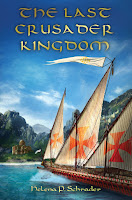As I've noted elsewhere, I have often found historical places inspiring.
Kantara is one of those places.
I fell so in love with this castle on Cyprus that it is almost possible to say that is responsible for my entire series of novels set on Cyprus -- but not quite. Other places on the island (that I will introduce you to later) also played their part. Nevertheless, many of the characters and events my readers will discover both in "The Last Crusader Kingdom" and "The Lion of Karpas" sprang from the mists that swirl around Kantara.
Here is a brief history.
Here is a brief history.
The view up to the castle.
Kantara is located on the tip of a long, narrow ridge as the Kyrenia mountain range comes to an abrupt end overlooking the plain of Karpas. It sits 630 meters (2,067 feet) above the Mediterranean.
And the View Down to the Sea
Although the fundamental structure was constructed under the Byzantine Emperor Alexius I Comnenus after the Greek Empire re-established firm control over the island of Cyprus, the name is thought to derive from Arab the words "kandara" (high building) or "kandak" (castle). This suggests there may have been an earlier structure, an outpost or watch tower, that occupied this strategic location before the Comnenus Emperor constructed a full-fledged castle.
During Richard the Lionheart's invasion of Cyprus in 1191, Kantara served as a temporary refuge for the Greek tyrant Isaac Comnenus and not even the great Lionheart made any attempt to take it. Then again, he didn't need too. He captured the seaside fortress of Kyrenia instead and with it Isaac's beloved daughter. The tyrant submitted without any further resistance after his daughter's capture.
During the bitter wars between Emperor Friedrich II and the barons, on the other hand, the castle of Kantara was subjected to a long and brutal siege. Defended by men loyal to the German emperor, the barons of Cyprus placed the siege under the command of Anseau de Brie. Brie built a trebuchet that, according to the contemporary chronicler and witness Philip de Novare (a fighting man in the service of the Ibelins), "battered down nearly all the walls." While this was doubtless an exaggeration, Ibelin also reports that the bedrock on and into which the castle was built defied destruction. Multiple attempts at assaulting the castle were successfully repulsed.
The castle only surrendered after ten months of siege due primarily to dwindling supplies and the demoralization of the garrison after the death of their commander, Gauvain de Cheveche.
During the Genoese occupation of Cyprus in late 15th century, the castle was held for the crown and was twice attacked by Genoese forces. It resisted both assaults successfully, and became the base for counter-attacks, preventing Genoese control of the Karpas peninsula.
After the collapse of Lusignan rule on Cyprus and the establishment of Venetian control in the 16th Century, the castle was abandoned and began to decay.
Left behind were the impressive structures that gradually became ruins and the legends. It was referred to by locals as "the castle of a hundred chambers" -- although according to legend the 101st chamber contained a treasure that no one had ever found. Or, alternatively, the 101st chamber was enchanted and if one fell asleep in it, one woke up years later in a lovely garden. Another local name for the castle was "the house/residence of the queen" -- although no specific queen appears to be associated with the castle historically.
The 19th century traveler D. Hogarth combines these themes suggesting: "...the traveler might imagine it the stronghold of a Sleeping Beauty, untouched by change or time for a thousand years."
The 19th century traveler D. Hogarth combines these themes suggesting: "...the traveler might imagine it the stronghold of a Sleeping Beauty, untouched by change or time for a thousand years."
Kantara certainly captured my imagination and my heart. It is the setting of many episodes of the (unpublished) "Lion of Karpas" and has a modest role in "The Last Crusader Kingdom."








